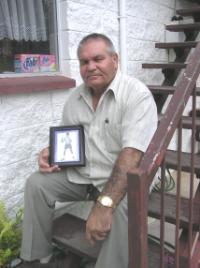Terry's long fight to find his place in the world
Published on 10 June, 2008
Terry Willmot spent most of his early life fighting to find his place in the world and now he is helping others do the same.
Nowadays he's confident and self-assured and draws on his experiences to counsel a wide range of people through his church and school networks.

Terry Willmot ... still fighting but more at peace with himself
But Terry has often lacked control in his life, starting from the age of 3 months when he was taken away from his birth parents under the then Assimilation Act and sent to the Cherbourg Reserve Aboriginal Mission (in 1947).
"I was deemed half-cast and left for dead at the hospital," he said.
The lack of control continued later on as Terry was assigned a religion based on the lightness of his skin and assigned a wife based on the beliefs of his elders.
The identity of his brother and sister were kept secret, even though they were also at the Mission. Even Terry's real name was a mystery until he needed a birth certificate and ransacked the Mission files to find out.
Terry needed a permit just to visit the shops and play sports in the nearby town of Murgon and many times he would run away, only to be brought back.
He was confined to the Mission until the age of 19, attending school until grade 4, learning limited reading and writing.
"We were taught under the Robert Crawford Syllabus," Terry explained. "The men were taught to be labourers and the women were taught to be domestics.
"We were fed rations and basically had no human rights."
However, there were some good aspects of Terry's early life. An Aboriginal Mission cook called Daisy took him as her own son - despite protests by government authorities and nurses - and he was also guided in bushcraft by the local elders.
He also met some good white friends when he was allowed to leave the Mission for work and he found a job at the Kilcoy meatworks.
Kilcoy was also a turning point as he was talent-spotted as a southpaw boxer and moved to Victoria, where he developed as a top-ranked professional fighter who featured in televised bouts.
His boxing career was colourful - it included giving Lionel Rose a hiding outside the ring and his brother Ray a knock-out in the ring - but it was the taxman who proved to have the real knock-out blow.
In quick succession, Terry experienced financial ruin, the breakdown of his marriage, a drinking problem, a serious illness for one child and a serious injury to another. But he found a way back through the kindness of a Christian teacher and the inspiration of the Revival Fellowship Church.
He moved back to Queensland to try to repair his marriage but, despite failing, he eventually met and married his second wife, Susan, and had more children with her.
"To give Susan what I felt she was entitled to in the way of a lifestyle I decided I needed some skills to succeed in a white man's world," Terry said.
That's what inspired him to start the ball rolling to first complete his Year 10 equivalency at TAFE and then to tackle a University degree.
He enrolled in an Arts degree program at Central Queensland University through Nulloo Yumbah, the University's Centre for Indigenous Learning, Spirituality and Research.
And he succeeded with his studies (completing in 2004) despite a range of disabling illnesses (at this point Terry shows the scar from his heart bypass operation).
Education was always 'more than a piece of paper' for Terry. For a start, he believes that knowledge requires wisdom to guide it. But his subject choices - including psychology, social work and sociology - have also helped with the latest phase of his life as a counsellor.
Now semi-retired thanks to his disabilities, Terry is keen to continue guiding others - both black and white - who feel they don't fit in. After all, he can certainly understand their pain.
Terry said he is often confronted with Indigenous students' learning difficulties. He makes it his business to help parents understand the stage their children are at and helps stop the children slipping through the system.

